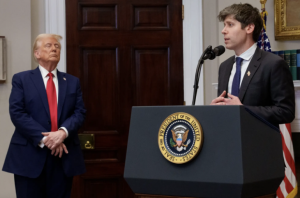UC Santa Barbara professor shares impact of capitalism with CSUSM Lecture on campus reveals economic research findings
October 29, 2015
Professor and author William Robinson introduced the findings of his research on the effects capitalism has on a global scale and its impact in the sociological world.
Robinson has dedicated his years teaching and researching Sociology and Latin America Studies at UC Santa Barbara.
Robinson was invited by students Erendira Hernandez and Oscar Soto as a guest lecturer through the Arts and Lectures program on campus. Robinson presented his published findings on the issues of capitalism’s growth to a group of about 100 individuals in the Arts 240 auditorium.
His findings can be categorized in three ways: the marginalization effect capitalism has, capitalism’s control across the globe and the limits of the economy.
The first tile of Robinson’s research is marginalization, specifically the marginalization of wealth. Based on Robinson’s research, 20 percent of the world’s population own more of the world’s wealth than the last 80 percent of the world’s population. Of that 20 percent, one percent owns over 40 percent of the world’s wealth.
Robinson explains that there is a pattern of increasing wealth among the one percent. Their income increases by 50 percent while the income of the bottom 80 percent decreases. This distribution of wealth influences the other two tiles in this global domino effect.
The second issue presented was about how capitalism allows an elite minority to have influence over government in a way that the rest of society does not. The wealthiest one percent keep their wealth by trading with the top 20 percent and avoiding the bottom 80 percent. To keep control of their wealth, Robinson found, they need to protect themselves from the bottom 80 percent. According to Robinson, they have done this by increasing militarization and creating businesses that profit from imprisoning people.
As mentioned by Robinson, those commonly imprisoned are of underprivileged and minority groups, making them the most susceptible to injustice. The threat of imprisonment that middle class and lower class people face is a form of control used by the wealthy. According to Robinson, the top one percent’s incredible wealth allows them to control not only education, but symbolism and imagery as well.
Robinson said to his audience that this happens in America today with the release of information of the NSA through Edward Snowden’s reports. Now, Snowden lives in exile in Moscow, Russia.
According to Robinson, as capitalism gives to those who can afford the cost of marginalization and control, it reduces nature to an economic resource.
During the lecture, Robinson shared details about how capitalism has damaged and reduced the earth’s natural resources. The desire for resources has contributed to global warming and the sixth extinction, the first human caused extinction in recorded history.
Robinson said that these economic and social issues are embedded into the structure of society. Until a systemic change is made, nothing will change and current social, economic and natural conditions will continue to worsen across the world.





